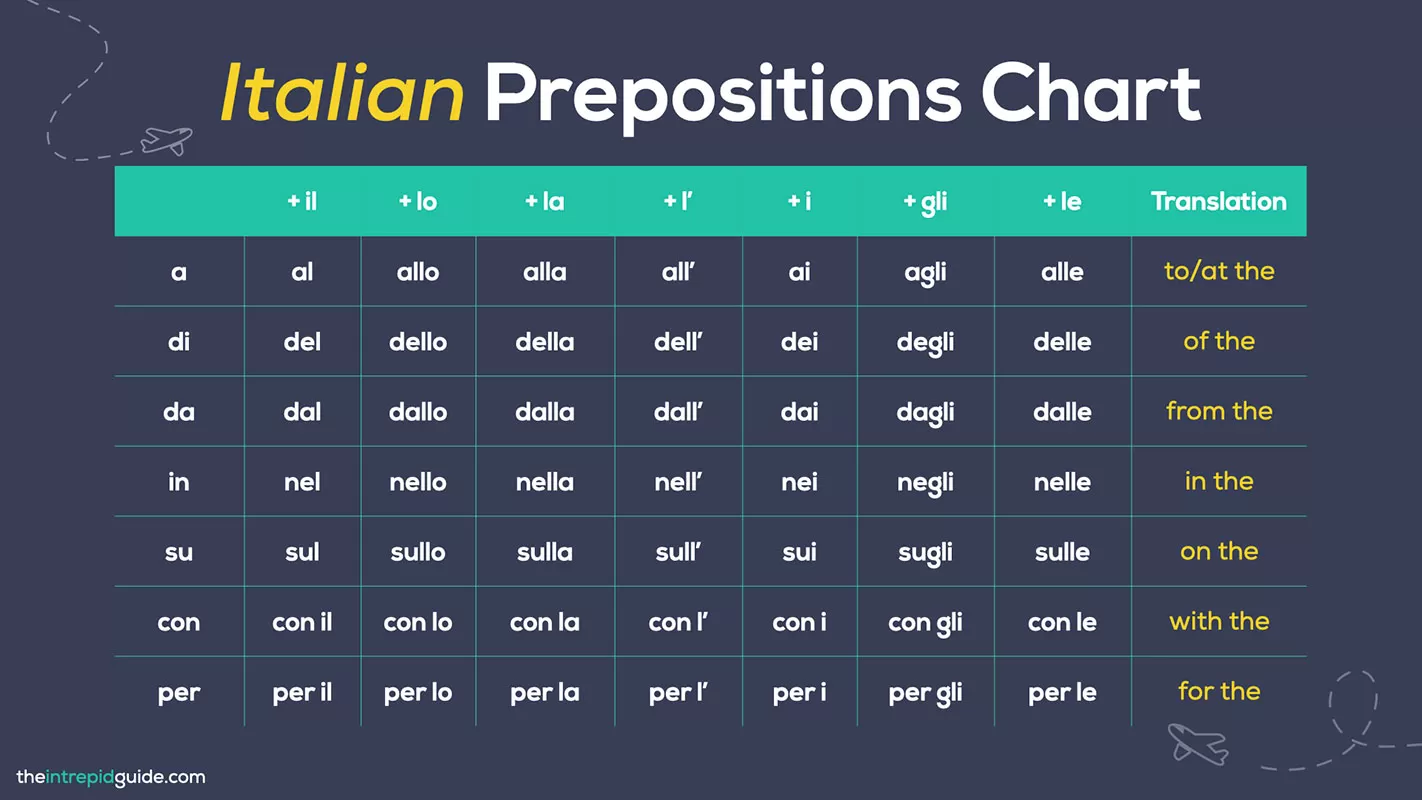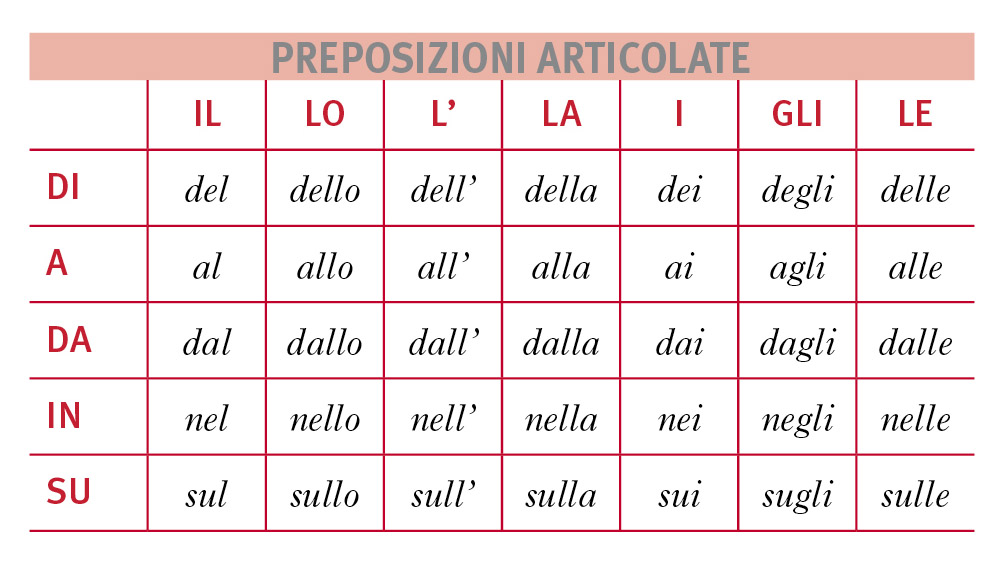
A Comprehensive Guide to Italian Prepositions
Introducing Italian Prepositions When they are not followed by an article, Italian prepositions are called "simple prepositions". There are nine of them: di, a, da, in, con, su, per, tra, fra. "Di" Di can be translated into English as "of" "from", "about" and sometimes even "in". When Di is combined with definite articles, it looks like this:

Chart of some italian prepositions Learning italian, Italian language
The simple prepositions in Italian are "di," "a," "da," "in," "con," "su," "per," "tra" (or "fra"). Articulated prepositions, on the other hand, are formed by combining a simple preposition with a definite article, such as "il," "lo," "la," "l'," or "i," "gli," "le," depending on the gender and number of the noun that follows.

Italian Prepositions & Prepositional Articles — Weilà!
I'll put links for everything down below. On the left most column we have the Italian Prepositions (at, in, of, for, on respectively). When you put the Prepositions and the Definite Articles together, you form a Prepositional Article! And that's what we have in Italics (slanted font). Prepositional Articles are used to say things like "on the.

How to use Italian Prepositions Italian lessons, Prepositions
Get the latest news and gain access to exclusive updates and offers

Italian Prepositions The Only Guide You'll Ever Need (PLUS Italian
What Are Italian Prepositions? Prepositions are short required words that compliment nouns, pronouns, adjectives and adverbs. As we will see in this post, the main Italian prepositions are: di, da, a, in, su, per, con and fra/tra. We use prepositions to indicate relationships, such as at what time something happens, or who owns what.

Italian Prepositions The Only Guide You'll Ever Need (PLUS Italian
The main Italian prepositions are di, a, da, in, con, su, per, and tra/fra. The prepositions di, a, da, in, su can be simple (not tense) or articulated (tense with the corresponding article). Per, tra/fra have just the simple form, while con can only become col. Tra and fra have exactly the same meaning; it is just a stylistic choice for the.

Preposizioni articolate Imparare l'italiano, Suggerimenti per la
Definite articles (il, la, lo, etc.) are the Italian words for the. Simple prepositions Simple means that the prepositions appear alone, without contracting with the definite article. Below are the most common prepositions, in their simple form. The chart above includes the most common prepositions along with their most common meanings.

ITALIAN PREPOSITIONS LIST FREEBIE Teaching Resources
Which are the Italian prepositions? The key prepositions are the simple prepositions ( preposizioni semplici) are di, a, da, in, con, su, per, tra/fra. Overcome your barriers in 3 minutes What's holding you back from becoming fluent? Find out with this free checklist! FREE DOWNLOAD loading.

Italian Prepositions The Only Guide You'll Ever Need (PLUS Italian
Sono di New York. = I'm from New York. You can use di to indicate the material of which something is made. For example: Il maglione di lana = The wool sweater (It might help you to think of this translation as "the sweater of wool," which sounds a little formal or old-timey, but is still appropriate.)

Italian Prepositions The Only Guide You'll Ever Need (PLUS Italian
The Italian prepositions are: DI, A, DA, IN, CON, SU, PER, TRA, FRA. Let's try to understand when and how to use them! DI indicates: possession → La valigia è di Giada.

Italian Prepositions Commonly Used Words
Italian preposition: di. We use di in Italian in many situations. It's similar to "of", or "about" in English. Here's when to use it: 1. To talk about ownership or show possession. This acts similarly to how "apostrophe + s" or "of" works in English. Il gatto è di Maria. (The cat is Maria's).

9 Reasons You’re Making Mistakes With Prepositions in Italian and How
1. Exercises 1.1. Exercise on translation of simple prepositions (English to italian) - Drag text 1.2. Exercise on translation of simple prepositions (English to italian) - Fill in the blanks 1.3. Exercise on the function of Italian simple prepositions - Fill in the blanks 1.4.

Articulated Prepositions
Italian kids often learn the prepositions in a particular order or with a song because it's just easier to remember that way. I suggest you make flashcards, put them all in a row and slowly take cards out as you train your mind to fill in the gaps.Repeat until you don't need any of the cards anymore.

Belajar Bahasa Italia > Preposisi dan Artikel
Italian prepositions are divided into three groups: Italian simple prepositions (called preposizioni proprie): they are very short and in most cases can merge with an article to generate an articulated form. Italian articulated prepositions (called preposizioni articolate): formed by a simple preposition + an article.

Italian Prepositions The Only Guide You'll Ever Need (PLUS Italian
Generally, articulated prepositions are formed any time a noun following whatever preposition you're using requires an article. So, for example, instead of saying Il libro è su il tavolo, you say, Il libro è sul tavolo . Or, instead of saying, Le camicie sono in gli armad i, you say, Le camicie sono negli armadi.

Pin di James Pearson su Italian Imparare l'italiano, Istruzione
For example, a + il = al. You can think of this contraction like the English 'it is' to 'it's'. It helps with phonetics and contributes to the flow and melody of the language. Contracted Italian Prepositions Chart Here's a chart of all the possible variations for the prepositions we saw earlier and the articulated preposition for each.